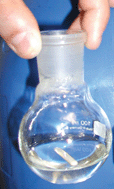Low melting sugar–urea–salt mixtures as solvents for organic reactions—estimation of polarity and use in catalysis
Abstract
Mixtures of sugars, sugar alcohols or citric acid with urea and inorganic salts form stable melts if heated to 70 °C. The polarity of the melts was estimated using solvatochromic dyes and found to be in the range of DMF or water, depending on the sensitivity of the dye for hydrogen bonds. To explore the use of the melts as solvents in catalysis, Rh-catalyzed hydrogenations and Pd-catalyzed Suzuki reactions were performed. The hydrogenation of a double bond is sensitive to the composition of the melt, and no effect of the chiral melts on the stereochemical outcome of the reaction was observed. The Suzuki coupling proceeds rapidly, cleanly and quantitatively in all examined melts. The results recommend the non-toxic sugar–urea–salt melts as more sustainable reaction media for chemical transformations.


 Please wait while we load your content...
Please wait while we load your content...